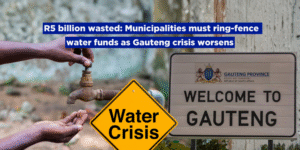Honourable Chairperson, Honourable Members,
Water is a basic human right, essential for life, health, and economic development. Yet, across South Africa, millions of people experience dry taps, waterborne illnesses, and collapsing infrastructure—not because of drought or natural disasters, but because of political failures at the municipal level.
Year after year, we receive damning Blue, Green, and No Drop reports, exposing how water infrastructure is crumbling, how wastewater treatment plants are polluting our rivers, and how municipalities are losing up to 40% of their water through leaks. The problem is not a lack of solutions. It is a lack of political will to implement them and a lack of consequences for those responsible.
Honourable Chairperson, too often we hear that municipal officials lack the technical skills to manage water services effectively. That may be true in some cases, but let’s be clear: the real problem is not weak officials—it is weak leadership. The problem is that the very politicians meant to oversee water provision are instead prioritising patronage over service delivery, protecting cadres instead of competent officials, and tolerating corruption instead of ensuring accountability.
1. The Consequences of Leadership Failure
South Africa does not lack engineers, planners, or professionals capable of fixing our water crisis. What we lack is the political leadership to ensure that competent people are hired, that budgets are spent wisely, and that failing municipalities face real consequences.
Consider the city of Makhanda, formerly known as Grahamstown. Once a vibrant educational hub, it has been plagued by chronic water shortages due to financial mismanagemient and under-spending on infrastructure. Residents have endured prolonged periods without water, leading to service delivery protests and legal action against the municipality. I studied at Rhodes University, and the town’s economy is reliant on the education sector, including the University and the many excellent schools. These water outages are a threat to this amazing educational city, which is fair. What parent sends their children knowingly to a place without safe and secure water. This must change.
In Johannesburg, the situation is equally dire. In December 2024, the city experienced severe water supply cuts lasting up to 86 hours, disrupting daily life and critical services, including hospitals and the Constitutional Court. These outages were attributed to poor management, infrastructure failures, and corruption within the local government.
More recently, in September 2024, the Charlotte Maxeke Johannesburg Academic Hospital faced a water crisis that led to the cancellation of non-emergency surgeries and compromised patient care. The hospital was forced to divert elective surgeries to nearby facilities, highlighting the vulnerability of our healthcare institutions to municipal failures.
These examples are not isolated incidents; they are symptomatic of a broader leadership crisis in our municipalities.
2. Infrastructure Investment Will Fail Without Accountability
We can pour billions into water infrastructure, but if corrupt and incompetent leaders remain in charge, that money will be wasted. We have seen this pattern before—wasteful spending on water projects that never materialise, tenders that are awarded to politically connected individuals with no expertise, and budgets that vanish while communities go without water.
The time has come to hold leaders accountable for water failures. This means:
- Charging municipal managers and officials with misconduct if they repeatedly ignore water infrastructure maintenance.
- Declaring water failures a governance emergency, allowing for immediate intervention in municipalities that fall below acceptable service delivery standards.
- Voting out mayors and councillors in non-performing municipalities if water services don’t improve.
Without real consequences, we will be back here next year, reading another Blue Drop report filled with the same failures and making the same excuses.
3. A National Commitment to Water Accountability
Honourable Members, we need a national commitment to ending impunity in water management. Every official, every politician, and every government department responsible for water services must know that failure will no longer be tolerated.
- If a wastewater plant pollutes our rivers—someone must be fired.
- If a town runs dry due to mismanagement—someone must be prosecuted.
- If billions in water infrastructure funding disappear—someone must go to jail.
It is time to put the people first and make water provision a non-negotiable priority.
Conclusion
Honourable Chairperson, if South Africa does not fix its water governance, we will fail—regardless of how much money we invest in infrastructure or how many officials we train.
The reality is simple: without consequences, nothing will change.
Let this Parliament send a clear message—water is not optional, service delivery is not optional, and accountability is not optional.
South Africans deserve better, and it is our duty to ensure that they get it.
I thank you.




